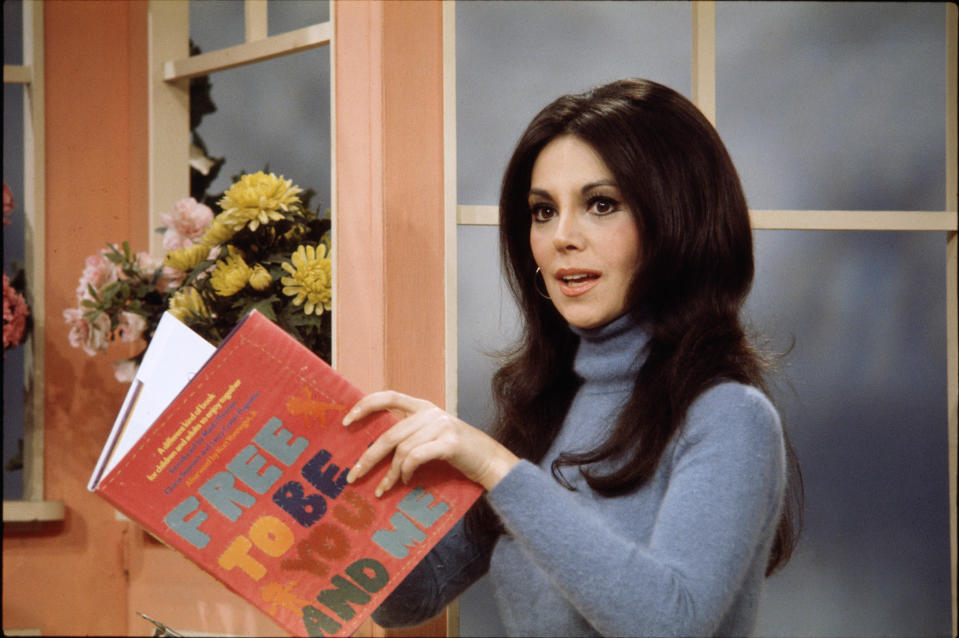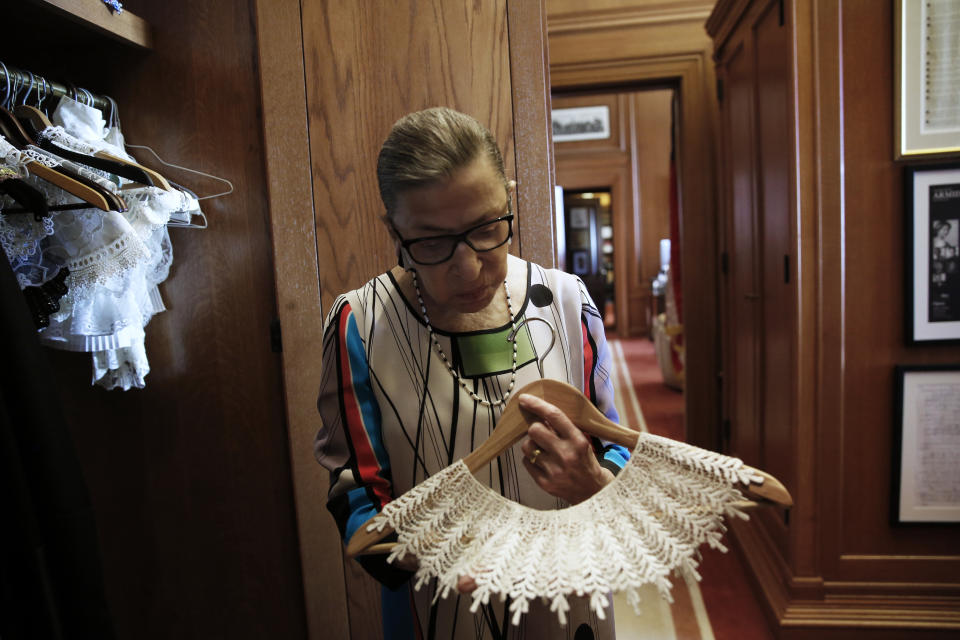Ruth Bader Ginsburg on her equal marriage and unique brand of feminism: 'Free to Be You and Me'
As the country reflects this week upon the extraordinary, barrier-breaking life and career of Supreme Court Justice Ruth Bader Ginsburg, who died of metastatic pancreatic cancer on Sept. 18, there are a slew of themes being highlighted as pillars to who she was, and to what her legacy will be — fierce independence, bravery, and a strong belief in not only women’s rights but human rights, and that nobody should be constricted by gender-based expectations.
But as Ginsburg explained to MAKERS in a 2014 interview — to the delight of Gen-X women everywhere — the best way to succinctly capture her view of feminism “is a song that Marlo Thomas [produced]: ‘Free to Be You and Me.’”

That, of course, was the title track on the same-named 1972 children’s album and TV special (in 1974) — a collaborative effort between Thomas and the Ms. Foundation for Women, with artists including Diana Ross, Carol Channing, Cicely Tyson and Alan Alda — that celebrated second-wave feminism. “Meaning,” Ginsburg went on, “that you were free to be, if you were a girl, a doctor, lawyer, Indian chief, anything you wanted to be. And if you’re a boy, and you like teaching, you like nursing, you would like to have a doll, that’s OK, too.”
The notion, embraced by the Ginsburg, was “that we should each be free to develop our own talents,” she said, “whatever they may be, and not be held back by artificial barriers — man-made barriers, certainly not heaven-sent.” And it was one that the eventual feminist icon fully embodied, even way back in 1956, when she was one of only nine women to enter Harvard Law School, and when women accounted for less than three percent of the U.S. legal profession.

“How fortunate I was to be alive and a lawyer when, for the first time in United States history, it became possible to urge, successfully, before legislatures and courts, the equal-citizenship stature of women and men as a fundamental constitutional principle,” Ginsburg wrote in a 2016 Op-Ed for the New York Times. “Feminists, caring men among them, had sought just that for generations. Until the late 1960s, however, society was not prepared to heed their plea.”
So, she went on to ask, “What enabled me to take part in the effort to free our daughters and sons to achieve whatever their talents equipped them to accomplish, with no artificial barriers blocking their way?”
It started with her mother, she frequently noted, including in the 2018 documentary RBG, and in her interview with MAKERS, in which she notes, “She was one of the smartest people I ever knew.” Though she lost her early — her mom died at 47 — she still had time to soak up her advice.
“She had two messages for me in my growing up years,” Ginsburg said, and the first was, “to be a lady. Don’t be distracted by emotions like anger, envy, resentment. These just sap energy and waste time.” And the other, she recalled, was “to be independent. Yes, she hoped I would meet Prince Charming and live happily ever after, but she stressed the importance of being able to manage on my own.”
Although, Ginsburg also admitted, it’s not like she never heard sexist messaging at home. “My family thought it would be a good idea [for me] to be a teacher. The notion was, it’s interesting work, it’s a good steady income, and women are welcome,” she said. “I will confess that my family was not entirely happy with … my decision not to pursue a career as a high school teacher and instead go to law school — until I married my dear husband Marty. Because the idea then was, well, ‘Ruth wants to be a lawyer, she has a husband who can support her, so it’s OK.’ “
Little could anyone have predicted that, in the ’50s, she would meet a man who was such a feminist that she frequently credited him for allowing her to thrive. Ginsburg (née Joan Ruth Bader) met the love of her life, Martin, early, while the two were still in college at Cornell University — she was 17 and he was 18. And rather than hold her back, she said, he valued her independence.
When they met, she told MAKERS, “we each had a significant other someplace else, and so that’s how we started out as best friends. Then I came to appreciate that Marty was really interested in what I thought,” she added. “Most boys at that time really didn’t care if a girl had a brain. In fact, it would be better if she didn’t.”
Then, at every stage of their life together, Ginsburg says, her husband supported career goals. “I come to law school,” she recalled, about attending Harvard at the same time as Marty, “I’m a little concerned about how I will fare, with a 14-month-old child. Marty is bragging to all the people in his class that his wife’s going to be on the law review. That’s how he was.”
Further, when Ginsburg got her first good D.C. job, on the U.S. Court of Appeals, “so many people thought I was commuting back and forth to New York,” she recalled. “They couldn’t imagine that Marty would’ve left his very successful practice in New York to come to Washington D.C. so that we would have our life together here.” On top of that, she explained, her husband was a “fabulous” cook, while Ginsburg was famously challenged in the kitchen. “My daughter Jane, who is herself a very good cook today, in her high school years noticed a tremendous difference between mommy’s cooking and daddy’s cooking, and decided that mommy should be phased out of the kitchen altogether.”
And so she was, and Marty would helm a nightly routine while she was off at work, she recalled, as he “would start to call around 7 o’clock and say, ‘It’s time to come home for dinner.’ Then he’d call at 7:30, say, ‘It’s getting late,’ 8 o’clock, ‘Come home.’ He was always there when I needed him… he was a remarkable man.”

So remarkable, in fact, that Daniel Stiepelman, the screenwriter for the RBG biopic, “On the Basis of Sex,” recalled that when folks in Hollywood would read his script, they’d tell him to change the idyllic relationship between Ruth and Marty, finding it far-fetched. “It came up a lot,” Stiepleman told the New York Times. “I remember at some point saying in a meeting, There’s a 5,000-year history of narrative, of men coming home from battle, and their wives patch them up and boost their egos and send them back out to fight again. You write one supportive husband, and everyone’s like, such a creature could never exist!”
But he did, said Ginsburg, who told MAKERS, “He was so comfortable about himself that he never regarded me as being any kind of a threat. On the contrary, I think he figured out, well, he’s so good, so the person he picked to be his life partner has got to be the cat’s meow.”
Read more from Yahoo Life:
Want lifestyle and wellness news delivered to your inbox? Sign up here for Yahoo Life’s newsletter.

